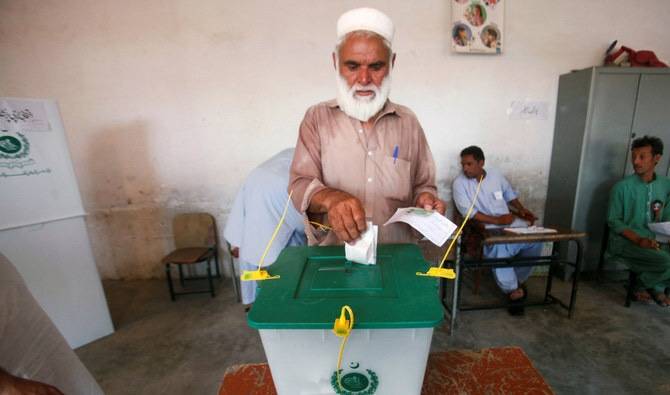Voters in Sibi district in Balochistan, turned out in significant numbers to vote in the by-election held for the district’s only Balochistan Assembly constituency PB-08 on November 17, which had fallen vacant due to the death of Sardar Sarfraz Chakir Domki, who was elected to the seat during the General Elections (GE) 2024. Although the voter turnout declined by five percentage points from 49 percent during GE-2024 to 44 percent in by-election, it was still higher than the recent by-elections held in Punjab’s Rahimyar Khan (NA-171) and Khyber Pakhtunkhwa’s Bajaur (PK-22) where the turnout remained 36 percent and 26 percent, respectively.
According to Free and Fair Election Network’s (FAFEN) observation, the by-election was marked by instances of illegal campaigning and canvassing around polling stations, an electoral irregularity that has persisted during all elections observed by FAFEN. According to Sections 177 of the Elections Act 2017, canvassing or campaigning within the close proximity of a polling station is prohibited to ensure the secrecy and fairness of the voting process. Moreover, the by-election also saw a boycott in the middle of polling by an independent candidate who alleged that the Pakistan Peoples’ Party Parliamentarians (PPPP) candidate for exerting undue influence during the campaign and on the election day. The ruling PPPP retained the seat, with the boycotting candidate finishing as the runner-up.
The number of invalid votes decreased dropping from 1,446 (three percent of the polled votes) during GE-2024 to 533 (one percent of the polled votes) in the by-election. The vote share of the winner, PPPP, increased from 50 percent in GE-2024 to 70 percent in the by-election, while the vote share of the boycotting independent candidate, Mir Muhammad Asghar Khan Marri, who finished as the runner-up in both elections, dropped from 43 percent in GE-2024 to 23 percent in the by-election. The provisional consolidated statement of the results of the count (Form-47) was completed around 12:30 am on the night following the poll day. Moreover, Sibi district experienced a shutdown of cellular services on election day for security reasons, which caused communication challenges for voters, candidates, polling staff, media and observers.
FAFEN deployed 10 trained observers — seven men and three women — to observe the voting and counting processes at 40 out of 124 polling stations (32 percent) established in the constituency. This report is based on the observations gathered from 19 of the observed polling stations.
The polling process saw persisting canvassing on election day and isolated instances of procedural omissions and irregularities, particularly concerning the inadequate availability of copies of result forms. FAFEN observers reported the presence of candidates’ camps in the illegal vicinity of eight of 19 observed polling stations, with banners displayed and voter chits and food distributed. Moreover, candidate-supported vehicles were seen providing transportation to voters at 16 of the 19 observed polling stations.
The majority of polling staff reported receiving a refresher training from Election Commission of Pakistan (ECP), with only two Presiding Officers and one Assistant Presiding Officer stating that they did not attend any such refresher prior to their deployment. Similarly, around one-quarter of security staff stationed at the entrance of polling stations indicated that they had not received training for election duty.
FAFEN observers interviewed 52 polling agents of the PPPP and independent candidates, all of whom expressed satisfaction with the polling process at the observed polling stations. The environment inside the observed polling stations was reported as conducive. However, at 23 polling booths in 19 observed polling stations, the placement of secrecy screen was such that it could have potentially compromised the secrecy of voters’ choices. The polling staff at all observed polling booths were complying with their responsibilities, from verifying voters to issuing ballot papers.
At 15 of 19 observed polling stations, adequate seating arrangements were provided for the elderly, sick, and voters with disabilities. FAFEN observers reported the presence of voters with disabilities at eight polling stations, while the transgender voters were seen at one polling station. The polling staff prioritized assistance for the voters with disabilities, transgender persons, and elderly voters. Moreover, all the observed polling stations were found accessible for voters using wheelchairs.
FAFEN observed the counting processes at 10 polling stations. However, this report includes reporting from five such polling stations. The counting at observed polling stations was generally conducted in a conducive and transparent manner.
At the five observed polling stations, the Presiding Officers provided the copies of the Result of the Count (Form-45) to all polling agents present. However, the copies of Ballot Paper Account (Form-46) were provided at two of five polling stations. FAFEN observers did not receive a copy of Form-45 at four of five observed polling stations, while no copied of Form 46 were provided at any of the five polling stations.
A total of 22 men contested for the constituency, with three representing parties – PPPP, Balochistan Awami Party (BAP) and Pashtunkhwa Milli Awami Party (PkMAP) – and the reminder running as independent. The ECP established 124 polling stations — 52 for males, 43 for females, and 29 combined — comprising 342 polling booths (187 male and 155 female) to accommodate more than 116,161 registered voters (64,223 male and 51,938 female) in the constituency. The ECP assigned up to 1,200 voters to 84 polling stations (67 percent), while 40 polling stations were assigned more than 1,200 voters each.
Please click here to download the complete report.




